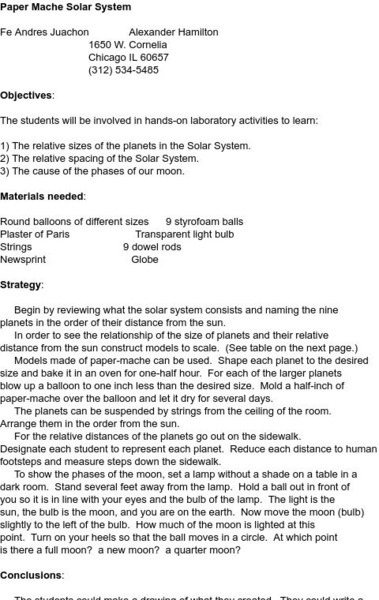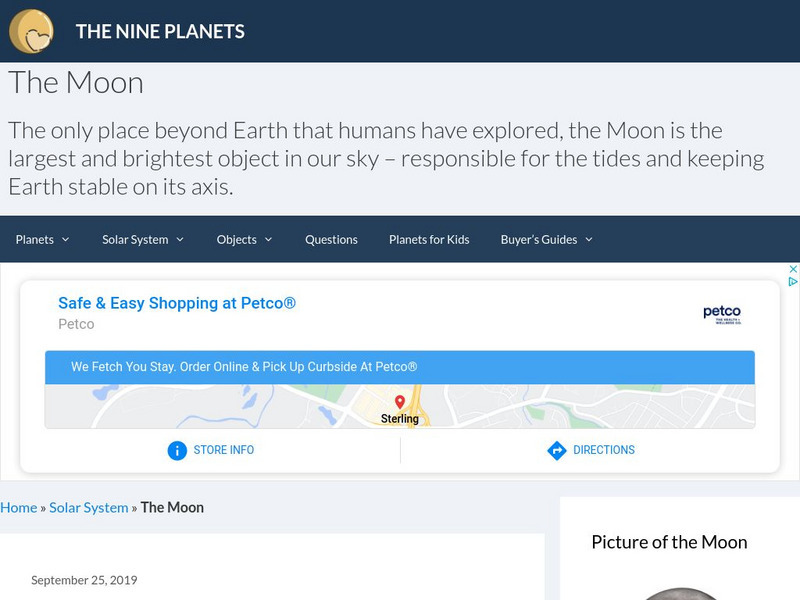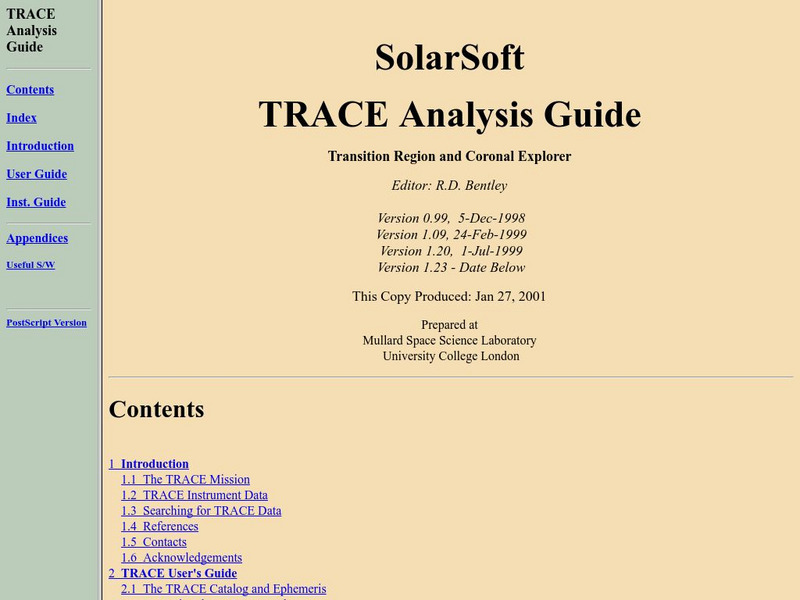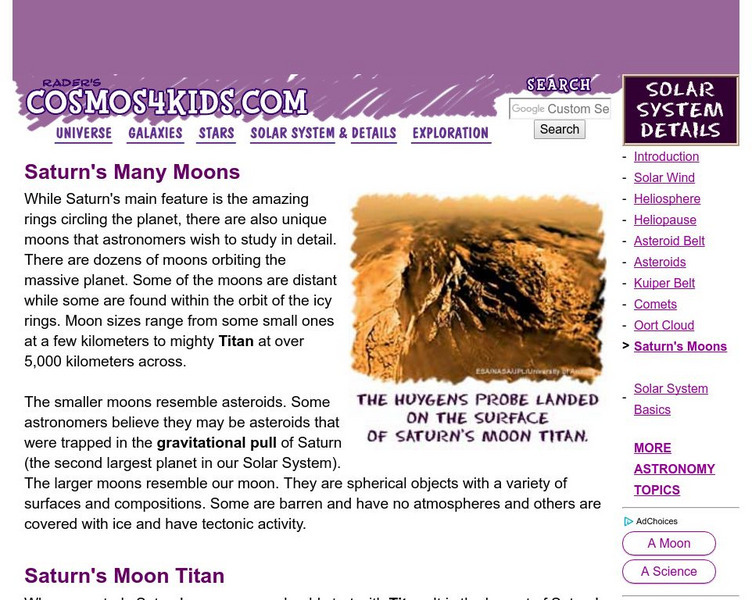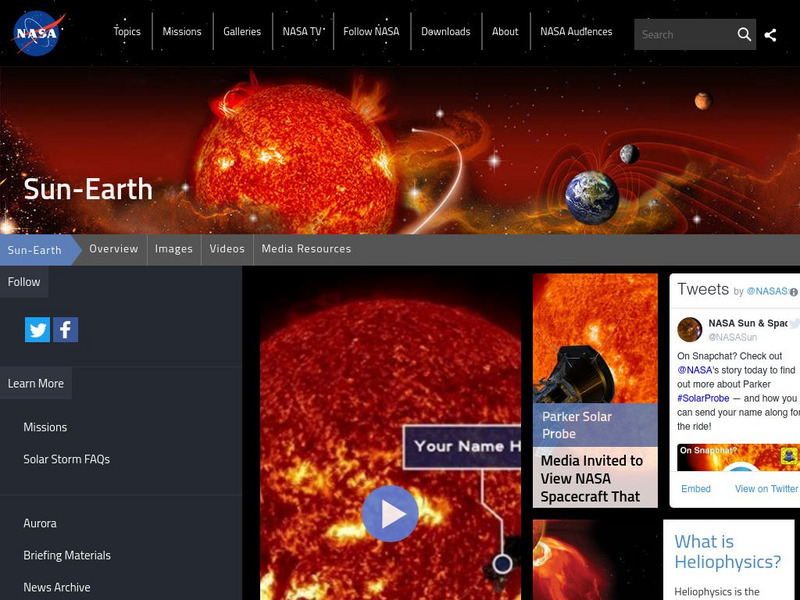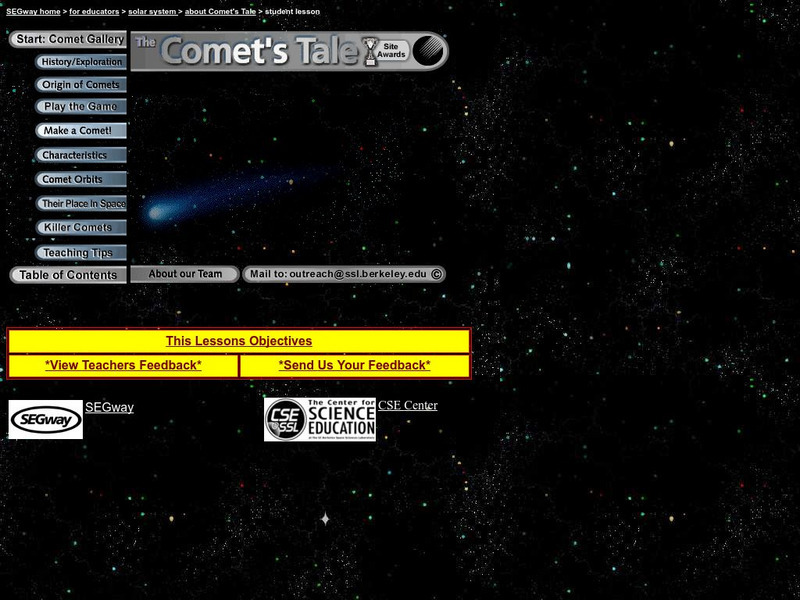Polk Brothers Foundation Center for Urban Education at DePaul University
De Paul University: Center for Urban Education: Learning About the Solar System [Pdf]
"Learning about the Solar System" is a one page, nonfiction, reading passage about the Milky Way gallaxy and how scientists learn about it over time. It is followed by questions which require students to provide evidence from the story;...
Utah Education Network
Uen: My Solar System
Students will use a simulation to build their own solar system discovering the relationship between gravity and motion that keeps a planet in orbit.
Science and Mathematics Initiative for Learning Enhancement (SMILE)
Smile: Paper Mache Solar System
This site from the Illinois Institute of Technology provides a set of directions for the creation of a solar system model out of paper mache. Includes orbital distances and planet diameters for the nine planets. Great idea for a student...
Nine Planets
The Nine Planets: The Moon
Explore the mythology, structure, observational history, gravitational force, and orbit of Earth's Moon.
Harvard University
Harvard University: The Solar System
These hands-on activities are a great way for students to gain perspective on the relative sizes and distances of each planet, the relationship between the sun and Earth, and much more.
Other
Solar and Astrophysics Lab: Trace Analysis Guide
This site provides a detailed overview of the TRACE (Transition Region and Coronal Explorer) satellite mission, data received, details about the instrumentation, and how to interpret the data.
Other
Sandburg Center for Sky Awareness: What Are the Shapes of the Planets' Orbits?
In this lesson plan investigation students learn about the shapes of the planetary orbits by experimenting with ellipses of different proportions.
Nine Planets
The Nine Planets: Comets
A detailed description of comets, their distinct parts, and the known comets in our solar system. Links are also provided for additional information on related subjects.
Cosmos 4 kids
Cosmos4 Kids: Solar System Details: Moons of Saturn
Explore the dozens of Saturn's moons orbiting the second largest planet of our solar system. Find out about the Cassini space mission which explored Saturn's largest moon, Titan.
NASA
Nasa: Heliophysics: New Science of the Sun Solar System Connection
This site from NASA lists common and uncommon misconceptions about Sun-Earth Science. Site also provides links to activities and lesson plans as well as background reading.
TED Talks
Ted: Ted Ed: Reasons for the Seasons
Why do some regions experience full-time heat while others are reckoning with frigid temperatures and snow? And why are the seasons reversed in the two hemispheres? Rebecca Kaplan explains how the shape of the Earth's orbit around the...
PBS
Pbs Learning Media: A Strange New Planet
This video segment adapted from NOVA features the first planet to be discovered outside our solar system. Its surprisingly large size and short orbit sent scientists back to their data and led them to discover similar planets. [3:06]
University of California
Univ. Of Cal Berkeley: The Comet's Tale
Site provides extensive information in the study of comets. Includes excellent graphics that depict what comets look like as they travel through the solar system. Also includes information on how comets may have effected the Earth's...
Harvard University
Harvard University: Eye on the Sky, Feet on the Ground
An ebook filled with information and classroom activities covering several astrological topics such as the Earth's rotation and the solar system. Many tips and teaching tools are available to aid in discovering what the sky has to offer.
American Geosciences Institute
American Geosciences Institute: Astronomy
Eight hands-on lessons module in which students explore the characteristics of planet Earth, its moons, the sun, the solar system, planets, and the difference between science fact and science fiction.
BBC
Bbc Schools: Ks2 Bitesize: Science: Physical Processes: Earth, Sun, and Moon
Help Sarah Jane and her team put the solar system's planets back in order. Following the activity, read more about the sun, the Earth, and its moon, and then take a quick quiz to check for understanding.
Science Buddies
Science Buddies: Using the Soho to Determine the Rotation of the Sun
This project shows you how to use images from an orbiting observatory to measure how fast the Sun rotates.
Other
Cometography.com: C/1995 01 (Hale Bopp)
This site provides a detailed overview of the comet C/1995 01 (Hale-Bopp), the great comet of 1997. Content includes discovery, and observational and orbit information, as well as several images.
Curated OER
Nasa's the Space Place: Solar System: Pluto's Orbit
An illustration showing Pluto's and the other planet's orbits around the sun.
Harvard University
Harvard Smithsonian: Everyday Classroom Tools
The focus of this series of lessons is to engage students in an exploration of the world around them. The emphasis is on inquiry as students learn about the earth, sun, light, shapes and more.
Other
University of Leicester: Comets
A detailed look at comets. Content outlines our observational history, as well as the origins of comets and an explanation of the appearance of comets.
NASA
Nasa Star Child: Space Probes to Venus
A brief discussion of the space probes that have reached the planet Venus.
University of Maryland
University of Maryland: The Astronomy Workshop
Find tools to calculate astronomical distances and sizes, to view various Solar System models, to compare gravity's affect on weight, and more. A good place to find interesting facts, simple animations, and astronomy links to physics and...


![De Paul University: Center for Urban Education: Learning About the Solar System [Pdf] Unit Plan De Paul University: Center for Urban Education: Learning About the Solar System [Pdf] Unit Plan](https://d15y2dacu3jp90.cloudfront.net/images/attachment_defaults/resource/large/FPO-knovation.png)
